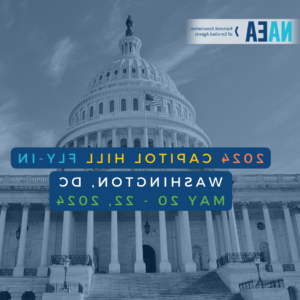
Rawad Abou Hassan; Susie DiMaggio; Rep. Jimmy Panetta (D-CA); Nancy Remo
NAEA Advocacy in Action
2023 is shaping up to be a critical year on many levels for tax policy and tax administration in Congress and at the IRS including new leadership at the IRS, new leadership in the Congress, new leaders and new Members serving on the House Ways and Means Committee, and new opportunities for NAEA advocacy.
2023 will also be an important year for NAEA advocacy and raising awareness about the enrolled agent profession. NAEA’s core focus for advocacy is to be the leading voice with governing bodies to address member challenges and effect change. To be that leading voice, we need to educate and build widespread support for NAEA advocacy through steady engagement with policymakers, regulators, coalition partners, social media, and news media.
Most people know something about taxes because they pay them, but not much else. Enrolled agents are the ‘boots on the ground’ for tax preparation and tax representation in communities across the nation and abroad. We have a responsibility to educate Members of Congress about the essential role enrolled agents play in the U.S. tax system.
We have a responsibility to build strong partnerships with the IRS working in close association with the new IRS Commissioner, the Office of National Public Liaison, leadership in the Return Preparer Office and the Office of Professional Responsibility, the National Taxpayer Advocate, and the IRS Advocacy Council.
Above all, we have a responsibility to raise awareness of NAEA advocacy and the work of enrolled agents through widespread communication on social media platforms and with the news media, particularly the tax industry trade press.
NAEA 2023 Policy Priorities:
• Implementing the Inflation Reduction Act
• Regulation of tax preparers
• Form 1099-K threshold
NAEA Capitol Fly-In

NAEA’s first Capitol Fly-In since the pandemic was a huge success. Thank you to the 85 NAEA members who participated in the Fly-In advocacy activities!
The two-day event May 23-24 kicked off with a Legislative Conference on Day 1 which included panel discussions with former IRS Commissioners Charles O. Rossotti, Fred T. Goldberg, Jr., and John Koskinen sharing their perspectives on efforts to transform the IRS; journalists from the Wall Street Journal, Politico, and Bloomberg Industry discussing the role of Congress in IRS oversight; and senior congressional staff from the Senate Finance Committee and House Ways and Means Committee on Tax Policy in the 118th Congress.
Day 2 of the Fly-In started with a NAEA PAC Breakfast with House Ways and Means Committee Chairman Jason Smith (R-MO) and 22 Congressional Club PAC participants followed by a full day of meetings on Capitol Hill. NAEA members participated in 89 meetings with congressional representatives from 28 states and four meetings with Ways and Means Committee representatives. The meetings were well attended and focused primarily on NAEA’s Policy Priorities.
The Fly-In presents a unique opportunity for members to engage in grassroots awareness on tax policy and advocacy issues while also interacting with fellow enrolled agents, getting to know your representatives and taking part in the political process.
NAEA’s Government Relations team, by maintaining regular contact with congressional leaders and key tax administration officials, works to ensure the views of enrolled agents are represented in shaping federal policy. The team also provides assistance to NAEA’s affiliates as they build advocacy initiatives and defend the enrolled agent credential.
Our staff works with elected leadership, committee chairs, committee members, and the membership more broadly to focus NAEA’s efforts. NAEA in turn formulates these desires into strategies and actions and serves as the profession’s definitive policy expert and liaison to Congress and the IRS.
Learn more about Fly-In here. Contact our office by phone at 202-822-NAEA (6232), toll-free at 855-880-6232, or by emailing governmentrelations@bjxxhq.com.
2022 Advocacy Achievements
NAEA in 2022 was at the forefront of articulating the needs and advocating for a more workable IRS:
- Formation of stakeholder coalition, Tax Professionals for Taxpayer Relief Coalition, coalition letter to Treasury and the IRS outlining four actions the IRS can take to meaningfully reduce unnecessary burdens for taxpayers and practitioners during the upcoming 2022 tax filing season.
- Coalition letter to House Ways and Means Oversight Subcommittee Leadership regarding Oversight Subcommittee Hearing with the National Taxpayer Advocate on Challenges Facing Taxpayers
- Stakeholder coalition virtual Town Hall, media briefing, and forum to discuss frustrations with 2022 tax season and possible mitigating solutions.
- Letter to Senate Finance Committee and House Ways and Means Committee Leadership on tax filing requirements and retroactive tax changes for 2021.
- NAEA White Paper Recommendations on IRS Reform: “Putting Service Back Into the Internal Revenue Service”
- IRS hearing on proposed increase in EA user fees. Executive Vice President Megan Killian testified at the May 11 IRS hearing. NAEA also submitted a comment letter on the proposed regulations and met with officials from the Department of the Treasury, IRS, and the Small Business Administration
- Directly influencing the tax filing process by mobilizing letters from Members of Congress to IRS demanding IRS temporarily discontinue automated compliance actions.
- Advancing legislation that would allow Treasury to regulate the practice of tax return preparers.
- In the absence of a fly-in the past two years, the NAEA PAC in 2022 hosted a virtual event with Rep. Jimmy Panetta (D-CA), sponsor of legislation to regulate tax return preparers, and organized small group meetings with House Ways and Means Committee members, Reps. Dwight Evans, (D-PA), Mike Thompson (D-CA), and Oversight Subcommittee Chair Bill Pascrell. NAEA also engaged in in-person, one-on-one discussions with 8 members of the Senate Finance Committee and 11 members of the House Ways and Means Committee at 19 PAC fundraising events.
- Letter to IRS Commissioner Charles Rettig to improve Form 2848 processing.
- Letter to Treasury Secretary Janet Yellin and IRS Commissioner Charles Rettig with recommendations to prioritize IRS operational areas for IRA funding.
- Letter to IRS Commissioner Charles Rettig to extend the penalty relief filing deadline for filing a variety of non-filed tax year 2019 and 2020 (TY19 and TY20) tax returns.
- Letter to House Ways and Means Committee and Senate Finance Committee Leadership with priorities enrolled agents believe are essential to a well-functioning, efficient, service-focused tax administration system.
- Roundtable with IRS Acting Commissioner O’Donnell to discuss priorities for $80 billion in new IRS funding.
- Letter to IRS Acting Commissioner O’Donnell and all members of Congress about the worsening situation with IRS customer service, in general, and the Practitioner Priority Service phone system, in particular.
Additional engagement with the IRS
- Monthly meetings with the Office of National Public Liaison, along with other tax preparation stakeholders
- Engagement with the Return Preparer Office
- Regular feedback to the IRS on key issues and regulations
Additional engagement with Congress
- Meetings with key stakeholders on Capitol Hill related to IRS funding priorities
- Outreach to key congressional allies for help to spearhead a congressional letter to the IRS seeking an extension to the penalty relief filing deadline for filing a variety of non-filed tax year 2019 and 2020 (Tax year 2019 and Tax year 2020) tax returns.
- Outreach to key members regarding the ENABLERS Act and the expansion of anti-money laundering obligations.
Protecting An Enrolled Agent’s Right to Practice
- In May 2022, following a nearly two-year effort, NAEA legislation to exempt enrolled agents from Minnesota’s restrictive debt settlement service provider regulations (Statute 332B) was unanimously approved by the Minnesota Legislature and signed into law.
 2023: The Sleeping Giant Is Awake!
2023: The Sleeping Giant Is Awake!






 Success or Failure at the IRS: What Will Make the Difference?
Success or Failure at the IRS: What Will Make the Difference?